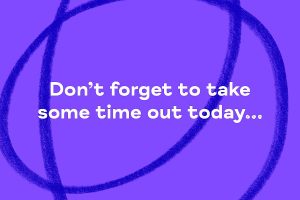Neurodiversity Celebration Week: Beth’s Story
20/03/2024

So, I’m late diagnosed and I have spent most of my life not realising I was neurodivergent…
But I had a lot of difficulties with my mental health but could never really pin down what it was. Until, as part of my master’s degree in psychology, I was doing a research project into assessment tools used for people with ADHD, specifically women and girls. Because obviously it’s underdiagnosed or misdiagnosed. And I was reading through a lot of the symptoms, traits and things that people struggle with, specifically women with ADHD, and I realised I related to a lot of them.
I kind of had that little niggle in my head thinking maybe this is it. So, I went to the GP and I asked them, after finding out about the long wait times for ADHD assessments. They have online forms and waited again. This was last March I went to my GP I think, I had my assessment 31 January this year, so it took a bit of time, I struggled a lot with Imposter Syndrome in that time, not being sure whether that was it or not. Yeah so, I had my assessment, got diagnosed. I joined Manchester Mind in September. I was bringing it up [my approaching assessment] with my manager and found out about the Neurodiversity Staff Network, at that time I was really struggling. I think that group has been massive for me, being able to speak to people who are going through similar or the same things. So that kind of helped me while I was waiting for my assessment.
I think growing up I was always looking for a label but none of them quite fit. I always knew there was something different, there was something ‘off’. I cycled through thinking maybe its depression? Anxiety? Maybe I’ve got bipolar? Maybe I’m borderline? Until it came to the point where I found ADHD and its presentation in women, and nothing has fit quite as well. When I’ve looked at other people who identify as autistic and ADHD, it’s the first time I’ve been able to look at someone and think ‘oh my god that person’s so like me’. It’s really validating. For women, we’re more likely to struggle with being perceptive, the emotional dysregulation, having quite extreme reactions, which people don’t really get. It’s something I’ve really struggled with. People can look at you and think ‘bipolar’, like massive mood swings, or ‘borderline’.
For some people, I’ve seen a lot of talk recently [online] about neurodiversity being sort of like a superpower. Which I’ve seen a lot of comeback towards that. Because it can be and is classified as a disability. I think a lot of people with ADHD would say it’s a disability because it does affect most areas of life. But on the other hand, it can make things easier too. I believe in celebrating the ways it makes us different and stronger in certain areas. ADHD people have a lot of creativity, they can think outside the box. A lot of people with ADHD end up being entrepreneurs for that reason. Just like anything there’s good sides and there’s down sides.
I think it’s just recognising that, it’s a way of being different but it doesn’t mean it’s necessarily bad or good… it’s just different.
I think for me [I was surprised] how much I actually struggled and how I thought it was normal. All these things that I’ve just gone along with and tried to deal with my entire life and not realised that not everyone has those struggles. I have quite a lot of sensory issues and that can make every day, like just leaving the house, quite difficult. I didn’t realise that wasn’t the case for everyone. So being able to get involved in a community and normalise that and feeling like I’m not alone and realising that some things are because I’m neurodivergent. I never would have known that if I didn’t have my diagnosis and go for the assessment.
Beth is our Mental Health Link Worker.
